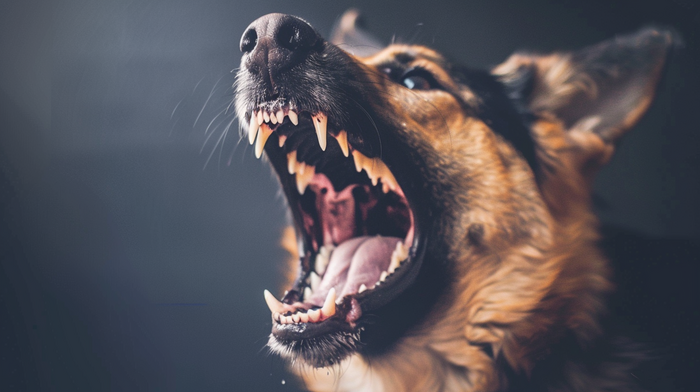Key points
- Minor dog bites can be treated at home with proper care to prevent infection and promote healing.
- Home treatments include stopping the bleeding, washing the wound, applying a sterile bandage, and antibiotic ointment.
- Prevention of dog bites involves understanding canine behavior, educating children, and respecting dogs' space.
- Medical attention is necessary for severe wounds, signs of infection, or if the dog has signs of rabies or is not up-to-date on its rabies vaccine.
- Medical attention is required for bites that show signs of infection, are on sensitive areas, are deep or large, don't stop bleeding after a few minutes, or if the dog is suspected of having rabies.

Home Treatments for Dog Bites
When it comes to treating dog bites at home, there are several important steps to follow to ensure proper care and prevent infection, according to WebMD.:
-
Stop any bleeding by placing a clean towel over the injury.
-
Keeping the injured area elevated above the level of the heart to help reduce swelling and promote healing.
-
Wash the bite carefully with soap and water to remove any bacteria from the wound.
-
Apply a sterile bandage on the wound can help protect it from further contamination.
-
Apply antibiotic ointment to the injury every day is crucial to prevent infection and promote healing.
- Get a tetanus shot if you haven't had one in the last five years.
- Find out if the dog has had its rabies vaccine. They may involve contacting animal control and getting the dog's vaccine records. Dogs should have a rabies vaccine every one to three years according to Advanced Care Vet Hospital.
- If the dog has signs of rabies or is not up-to-date on its rabies vaccine, seek medical attention immediately.
These simple yet effective home treatments can make a significant difference in the recovery process following a dog bite, according to WebMD.
How to Prevent Dog Bites?
Preventing dog bites is an essential aspect of safety for both individuals and the community. Understanding canine behavior and respecting their space can significantly reduce the risk of being bitten, according to the American Veterinary Medical Association (AVMA). They note that it's particularly important to educate children on how to interact with dogs, as they are the most common victims of dog bites. By following certain precautions and teaching responsible pet interaction, the likelihood of dog bites can be greatly diminished. Below are some tips that AVMA provides that can help prevent dog bites and ensure a safe environment for everyone:
-
Teach children not to approach strange animals: Children are naturally curious, but they should be taught to be cautious around unfamiliar dogs and to always ask for permission before petting someone else’s pet.
-
Do not provoke or tease animals: Dogs can react defensively if they feel threatened or teased. It’s important to treat all animals with respect and not engage in behavior that could be interpreted as aggressive.
-
Do not go near an animal that is acting strangely or aggressively: An animal behaving erratically could be a sign of illness, such as rabies. Maintain a safe distance and inform animal control rather than trying to capture or assist the animal yourself.
-
Do not try to play with any dog that is eating or feeding their puppies: Dogs can be protective of their food and their offspring. Disturbing them during these times can trigger a defensive reaction, potentially leading to a bite.
When Should You Call a Doctor?
While some minor dog bites can be treated at home, there are certain circumstances where medical attention is necessary, according to WebMD. They note that it is crucial to monitor the wound closely for signs of infection or severe damage, as these can lead to more serious health issues if left untreated. Knowing when to seek professional medical care can ensure proper healing and prevent complications. If you experience any of the following situations after a dog bite, WebMD recommends that you see a doctor as soon as possible:
-
There is swelling, redness, or pus draining from the wound
-
Animal bites on the head, face, neck, hands, or feet
-
Animal bites that are deep or large
-
Puncture wounds that expose muscle or bone
-
You are not sure if the wound needs stitches
-
The bleeding does not stop after a few minutes
-
You have not had a tetanus shot in the past 5 years
- If the dog has signs of rabies or is not up to date on its rabies vaccine
Urgent care near me
Going to urgent care is the fastest way to see a doctor for a dog bite. Find an urgent care near you and hold your place in line using Solv.
FAQs
What are the steps to treat a dog bite at home?
The steps include stopping the bleeding, washing the wound with soap and water, applying a sterile bandage, and using antibiotic ointment.
How can dog bites be prevented?
Dog bites can be prevented by understanding canine behavior, teaching children not to approach strange dogs, and avoiding provoking or teasing animals.
When should I seek medical attention for a dog bite?
Seek medical attention if the wound is severe, shows signs of infection, the bleeding doesn't stop, or if the dog shows signs of rabies or hasn't been vaccinated.
What should I do if the dog that bit me hasn't been vaccinated for rabies?
If the dog hasn't been vaccinated for rabies or shows signs of rabies, seek medical attention immediately.
Should I get a tetanus shot after a dog bite?
Yes, especially if you haven't had a tetanus shot in the last five years.

